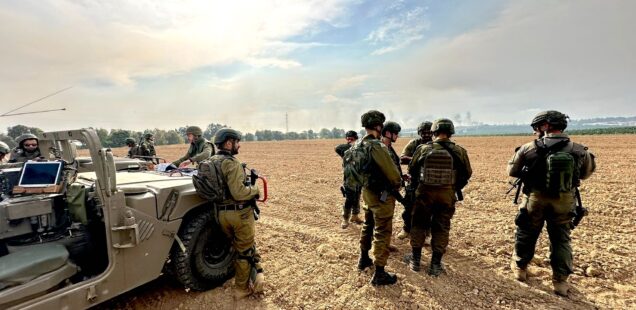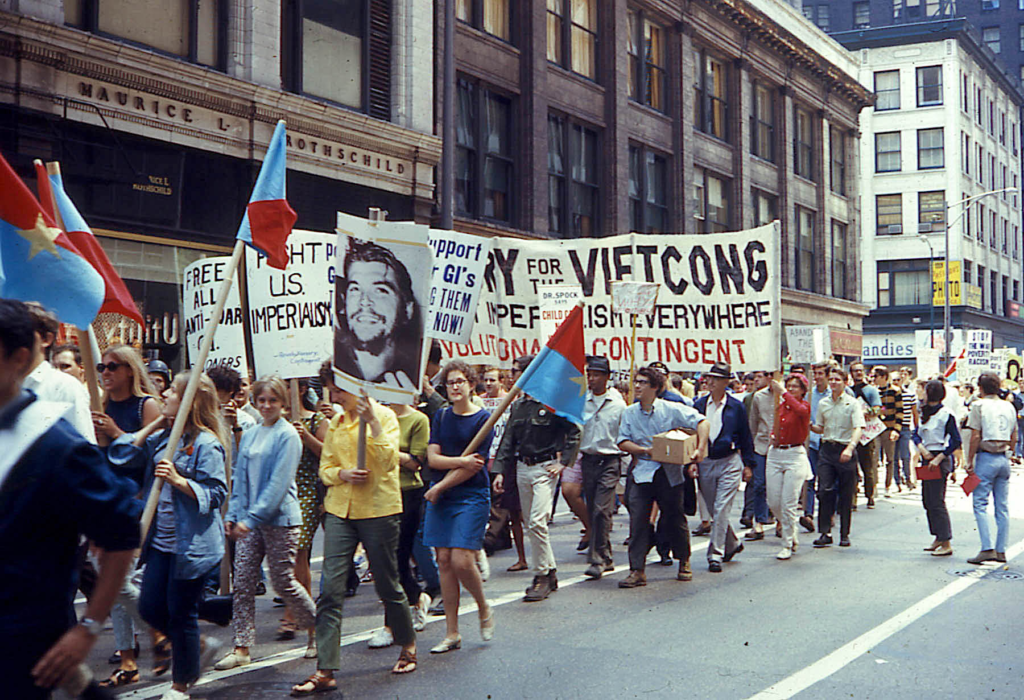
PATRICK LAWRENCE: Media’s Fatal Compromises
It is no longer enough to tether correspondents to the perspective of the military from whose side they report. We appear to be on the way to having wars fought — huge, bloody, consequential wars — without any witnesses.
The practice of “embedding,” which requires correspondents to report in war and conflict zones as part of a given military unit, struck me as a repellent compromise with power as soon as American media began accepting this unacceptable practice. It is an undisguised effort to control what correspondents see and hear, and so what they write or broadcast, and so what their readers, listeners and viewers think.
It is a trick, in short. The ruling or governing power’s military pretends it respects the rightful freedom of an independent press, while correspondents and editors get to pretend they serve as brave correspondents and principled editors.
There is no respect, bravery or principle in any of it. Embedding is a charade, an offense on the part of everyone who participates in it.
It is an act of deprivation in that it gives those reading or viewing the work of embedded correspondents the illusion they are informed while they are, most of the time, kept ignorant of the war or conflict they are eager to understand.
As in various other ways, Israel’s real-time barbarity in Gaza has worsened the relationship between media — Western media, I mean — and the powers they are supposed to report upon. As to audiences, they — we — are left utterly confused to the extent the common language with which people can communicate begins to fail them.
The result is not silence. It is a senseless cacophony that echoes through a weird no-man’s land in which nothing can be said without the risk of retribution or condemnation or banishment. Civil discourse is more or less out of the question.
We are now a dreadful step on from embedding, it seems. It is no longer enough to tether correspondents to the perspective of the military from whose side they report. We appear to be on the way to having wars fought — huge, bloody, consequential wars — without any witnesses.
Last week Politico published a lengthy piece on the Biden regime’s argument that the current “pause” in Israel’s merciless murder spree in Gaza and the exchange of hostages proves the policy cliques in Washington have done the right thing. It does not take much for these dangerously unqualified people to fool themselves.
But the White House remains “‘deeply, deeply worried’ about Israel’s longer-term strategy and what the next phase of the war may look like,” Politico reported. Then this:
“And there was some concern in the administration about an unintended consequence of the pause: that it would allow journalists broader access to Gaza and the opportunity to further illuminate the devastation there and turn public opinion on Israel.”
In plain English, Biden’s people fret about what the slaughter of Palestinians will look like once it resumes — appearances being not quite all but nearly. But if there was no one there to see and report the savagery, there would be no appearances to worry about.
Trita Parsi at the Quincy Institute brought this quotation to my attention, and I cannot do better than his comment on it: “I’m speechless.”
It is interesting that at least some people in the Biden regime seem to consider relations between power and the media to be adversarial in the old-fashioned way. And how fine it would be were the corporate press and broadcasters to get their correspondents into Gaza on their own and report what they see as they see it.
This seems to me perfectly possible. The BBC, Al Jazeera, and various wire services — Reuters, The Associated Press, Agence France–Presse — are among the news organizations with bureaus in Gaza City.
Since Vietnam

But the record to date indicates that cowardice and supine compliance will prevail over the aforementioned bravery and principle. This is how embedding journalists got started in the post–1975 years. The defeat in Vietnam spooked the Pentagon and the political leadership, which blamed the media for turning Americans against the war. By the Gulf War, August 1990 to February 1991, embeddedness was s.o.p. among American media.
A reporter named Brett Wilkins published a well-reported piece in Common Dreams a month into the Israel Defense Forces’ war crimes in Gaza. In “U.S. Corporate Media Outlets Allow IDF to Vet ‘All Materials’ from Embedded Reporters in Gaza,” Wilkins laid out the whole disgusting nine. His lead:
“U.S. corporate media outlets have granted Israeli military commanders pre-publication review rights for ‘all materials and footage’ recorded by their correspondents embedded with the Israel Defense Forces during the invasion of Gaza, a precondition condemned by press freedom advocates.”
Wilkins goes on to name a few of the names — among them CNN and NBC — who indulge their spinelessness in this manner. And he quotes the feckless Fareed Zakaria offering the boilerplate excuse for this gross breach of professional ethics. “CNN has agreed to these terms in order to provide a limited window into Israel’s operations in Gaza,” Zakaria deadpans.
Speechless a second time.
A photojournalist named Zach D. Roberts gets my award for the pithiest summation of this daily travesty. “What CNN is doing here is creating ad b-roll [supplementary video footage] for the IDF,” Roberts said. “It’s nothing resembling news and the CNN employees that participated in it aren’t anything resembling journalists.”
So far as I can make out there are few-to-no exceptions to this condemnable practice. The New York Times sent two correspondents and a photographer into Al–Shifa Hospital earlier this month and had the integrity to acknowledge they were escorted by the IDF and to report that a hole in the ground the diameter of a manhole cover did not look much like a Hamas command center.
But “limited windows,” in Zakaria’s slithery phrase, are nonsense, and the Times should have declined the tour on any terms but its own. This seems to me the only way the press and broadcasters can reclaim the professional sovereignty they gave up in the post–Vietnam years.
Devastated Credibility
Since then we have witnessed a succession of what I count as fatal compromises. This kind of conduct is part of what has devastated Western media’s credibility and left the reading and viewing public abandoned in the dark. Now we are down to embedding as bog standard procedure and the hinted possibility that correspondents may not be able to bear witness to conflicts and wars under any circumstances.
Journalists were once considered among the guardians of language. Writing and editing with rigorous attention to clarity and correct usage was how language as a vessel of meaning was preserved and protected.
Look at the circus all around us now. Anti–Semitism can mean anything you want it to mean. Ditto anti–Zionism. Anti–Israel can mean anti–Semitic, Hamas can be cast as a terrorist organization, a real-time genocide can be marked down as self-defense. The Times invites us, in Sunday’s editions, to wring our hands as we search for “a moral center in this era of war.”
It is an invitation to drown in blur and induced confusion. I put this down in part — in large part — to the derelictions of those reporting what is called — incorrectly, a case in point — the Israel–Gaza war.
I have watched recently a goodly number of videos recorded in Gaza and seen many photographs taken on the ground there. Here is a video of Gazans fleeing for their lives, published two weeks into the bombing by Al Jazeera. Here are some photographs shot by Mohammed Zaanoun, a Palestinian photographer, and published on Nov. 23 by The New Humanitarian, which was founded at the U.N. in the mid–1990s.
This kind of material, produced by professional journalists, various kinds of nongovernmental organizations, relief agencies and the like, is readily available. How differently would people think, how much clearer would their understanding and conclusions be, were our major media to make it available.
Patrick Lawrence, a correspondent abroad for many years, chiefly for the International Herald Tribune, is a columnist, essayist, lecturer and author, most recently of Journalists and Their Shadows, available from Clarity Press or via Amazon. Other books include Time No Longer: Americans After the American Century. His Twitter account, @thefloutist, has been permanently censored.
TO MY READERS. Independent publications and those who write for them reach a moment that is difficult and full of promise all at once. On one hand, we assume ever greater responsibilities in the face of mainstream media’s mounting derelictions. I take up this very topic in the commentary you have just read. On the other, we have found no sustaining revenue model and so must turn directly to our readers for support. I am committed to independent journalism for the duration: I see no other future for American media. But the path grows steeper, and as it does I need your help. This grows urgent now. If you are already a supporter, big thanks. If you aren’t, please subscribe to The Floutist, or via my Patreon account.
The views expressed are solely those of the author and may or may not reflect those of Consortium News.


Patrick. Another brilliant narrative… however, may I say, I do not agree with your statement This kind of conduct is part of what has devastated Western media’s credibility and left the reading and viewing public abandoned in the dark””. It’s folks like you who keep all that’s happening in this world lit up in lights. We’re not in the dark, if we choose not to be.